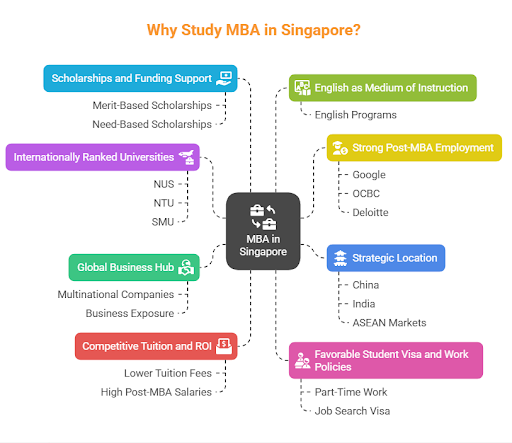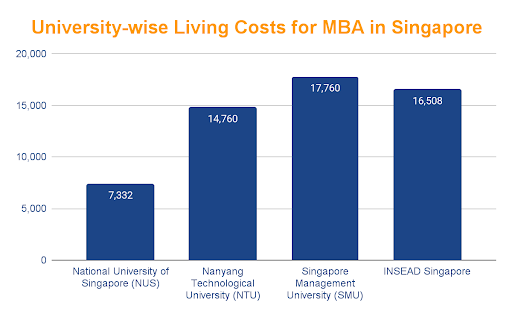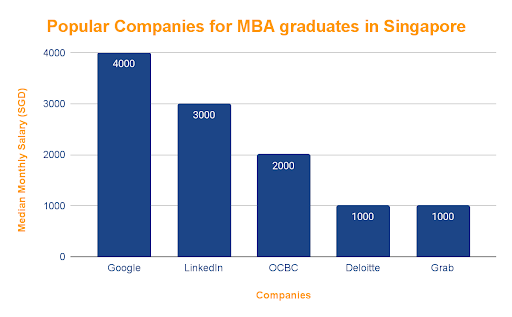
Manik Study Abroad Content Specialist
Study Abroad Content Specialist | Updated On - Jul 24, 2025
Highlights
- Intakes: The universities in Singapore offer MBA admission in March, June, and September intakes.
- Rankings: Singapore has 3 of the top 50 universities for MBA (QS Global MBA Rankings, 2024), namely, NUS (=24), NTU (34), and SMU (=43).
- Course Types: You can pursue full-time MBA, part-time MBA, Global MBA and Executive MBA programs in the universities in Singapore.
- Top Employers: Some top business employers in Singapore are, Amazon, P&G, Apple, Google, DBS, Flex, Citigroup, Sea, SingTel, OCBC Bank, CapitaLand, and Accenture.
MBA in Singapore and business-related master’s degree is pursued by over 10,000 international students every year. The country offers globally ranked business schools, access to multinational employers, and a strong return on investment.
The National University of Singapore (NUS) ranks #26 in the QS Global MBA Rankings 2025. Its MBA program offers global exposure, strong post-MBA outcomes, and over 300 corporate partnerships across Asia and beyond.
Nanyang Technological University (NTU) is ranked #32 globally. The NTU MBA emphasizes leadership, sustainability, and technology, and includes real-world consulting projects with Asian companies. Singapore Management University (SMU) holds triple accreditation (AACSB, AMBA, EQUIS). Its intensive 12-month MBA focuses on Southeast Asia’s fast-growing markets and international management skills.
Admission requirements for MBA in Singapore include a bachelor’s degree, 2–5 years of work experience, and competitive GMAT/GRE scores. English proficiency through IELTS (6.5–7.0) or TOEFL (90+) is commonly required.
Graduates of these programs are recruited by top firms such as Google, Deloitte, Grab, LinkedIn, and OCBC. Roles range from consulting and strategy to analytics and digital transformation. MBA salaries in Singapore typically range from SGD 28,000 to SGD 45,000 per year, depending on prior work experience and job role.
Check out: Study in Singapore

Top Universities for MBA in Singapore
An MBA in Singapore offers global exposure, strong industry links, and quick ROI through 1–1.5 year programs. Three business schools are ranked in the QS Global MBA Rankings 2025:
- NUS Business School at #25 globally,
- Nanyang Business School (NTU) at #36, and
- SMU Lee Kong Chian School of Business at #41.
These schools are known for world-class faculty, global cohorts, and corporate connectivity. Beyond these, Singapore offers quality MBA programs at affordable tuition through institutions like James Cook University and Amity Global Institute.
Below are the top universities for MBA in Singapore, their locations, and 2025 deadlines:
| University Name | Campus Location | Application Deadline (2025) |
|---|---|---|
| National University of Singapore (NUS) | Kent Ridge, Singapore | October 30, 2025 |
| Nanyang Technological University (NTU) | Jurong West, Singapore | March 15, 2025 (Closed) |
| Singapore Management University (SMU) | Bras Basah, Singapore | October 31, 2025 |
| INSEAD Asia Campus | one-north, Singapore | August 26, 2025 |
| Amity Global Institute | Tanglin, Singapore | September 22, 2025 |
| James Cook University – Singapore | Sims Drive, Singapore | December 1, 2025 |
| London School of Business and Finance (LSBF) | Cecil Street, Singapore | Rolling Admissions |
Also Read: Top Colleges in Singapore
Admission Requirements for MBA in Singapore
Admission for MBA in Singapore is competitive. Most universities seek a strong academic background, work experience, and English language proficiency. While exact criteria vary by school, here are the general requirements based on top institutions:
Academic Qualifications:
- A recognized bachelor's degree (in any discipline) from an accredited university
- Minimum second-class upper or equivalent GPA is preferred by top-ranked schools
Work Experience:
- 2 to 5 years of full-time work experience is typically required
- Some schools accept fresh graduates but prefer candidates with leadership or managerial roles
Standardized Tests:
- GMAT or GRE scores are accepted
- NUS MBA: Average GMAT 670
- NTU MBA: Average GMAT 660
- Some schools may waive GMAT for candidates with strong work profiles or academic merit.
English Language Proficiency:
- TOEFL: Minimum 90–105 (iBT)
- IELTS: Minimum 6.0–6.5 overall
- PTE Academic: Scores between 55–72
- DET is accepted by select universities like James Cook (minimum 100)
Other Application Components:
Most MBA universities in Singapore require:
- Statement of Purpose (SOP)
- Two Letters of Recommendation
- Updated Resume or CV
- Interview (online or in-person) for shortlisted applicants
Admission to top MBA programs like NUS, NTU, and SMU is highly selective. A strong profile with academic excellence, career achievements, and leadership potential increase the chances.
University Specific Requirements for MBA in Singapore
To get admitted into an MBA in Singapore, candidates must meet specific academic and language criteria. Most top universities require a GMAT or GRE score, though some private institutions waive it. Additionally, non-native English speakers must demonstrate proficiency through tests like IELTS, TOEFL, PTE, or Duolingo.
Below is a university-wise summary of test score and English language requirements:
| University | Program | Score and English Language Requirements |
|---|---|---|
| NUS Business School | MBA | GMAT 670, TOEFL 100 |
| Nanyang Business School (NTU) | MBA | GMAT 660, IELTS 6.0, PTE 55 |
| SMU Lee Kong Chian School of Business | MBA | IELTS 6.0, PTE 55 |
| INSEAD, Singapore | MBA | TOEFL 105, PTE 72 |
| Amity Global Institute | MBA | IELTS 6.5, PTE 42 |
| James Cook University – Singapore | MBA | IELTS 6.5, PTE 58, Duolingo 100 |
| London School of Business and Finance (LSBF) | MBA (International Business) | IELTS 6.0 |
Student Visa for MBA in Singapore
In Singapore, a student visa is officially known as a Student’s Pass. If you’re an Indian student planning to pursue an MBA in Singapore, you must apply for a Student’s Pass after receiving admission to a full-time program at an approved institution.
Part-time or weekend MBA programs are not eligible for a Singapore student visa.
Who Needs a Student’s Pass?
Indian and other international students must apply for a Student’s Pass unless they already hold a:
- Dependant’s Pass
- Long-Term Visit Pass
- Immigration Exemption Order
If your current pass expires or is canceled during your MBA, you must apply for a Student’s Pass to continue your studies.
Note: If you’re attending a short-term course that lasts fewer than 30 days and has no industrial attachment, you may be exempt—but this does not apply to MBA programs.
Key Requirements for a Student’s Pass:
- A confirmed offer from a recognized, full-time MBA program in Singapore
- The course must not be part-time or conducted only during evenings/weekends
- For children under 12 years, vaccination documents must be submitted (not applicable to MBA students)
When and How to Apply?
You can apply for the Student’s Pass through the Immigration and Checkpoints Authority (ICA) via the SOLAR+ online system. Processing typically takes 2–4 weeks, so apply well before your intake date.
The Singapore student visa application process may vary slightly depending on whether you’re enrolling in a government university or a private institution. However, all MBA applicants must meet the Student’s Pass eligibility criteria.
Cost of Living in Singapore for MBA Students
Planning your budget is crucial before pursuing an MBA in Singapore. While tuition fees form the major chunk of your cost, daily living expenses also impact your finances.
On average, the cost of living in Singapore for an international student ranges between SGD 7,000 to SGD 18,000 per year, depending on lifestyle and accommodation choices. This cost includes rent, food, transport, health insurance, and other daily essentials.
Breakdown of Living Expenses in Singapore (Monthly Averages)
| Category | Estimated Monthly Cost (SGD) |
|---|---|
| On-campus accommodation | SGD 325 – 605 |
| Off-campus shared apartment | SGD 1,000 and above |
| Transport (student MRT pass) | SGD 120 |
| Food (canteens/meal plans) | SGD 210 – 750 |
| Health insurance (yearly) | SGD 920 – 5,015 (pro-rated monthly) |
Living costs vary by university location and lifestyle choices. Below is a university-wise breakdown of the average annual living cost for MBA students in both SGD and INR.

MBA in Singapore Tuition Fees
Tuition fee is the most significant component when budgeting for an MBA in Singapore. Top institutions like NUS, NTU, and INSEAD charge premium fees, while private institutes offer more affordable options.
Depending on the university and course duration, MBA tuition fees in Singapore range from SGD 20,000 to SGD 105,000 per year.
MBA Tuition Fees at Top Singapore Universities:
| University Name | Annual Tuition Fee (SGD) | Annual Tuition Fee (INR) |
|---|---|---|
| National University of Singapore (NUS) | S$99,953 | ₹67.06 Lakhs |
| Nanyang Technological University (NTU) | S$81,750 | ₹54.85 Lakhs |
| Singapore Management University (SMU) | S$65,400 | ₹43.88 Lakhs |
| INSEAD Singapore | S$103,500 | ₹69.44 Lakhs |
| Amity Global Institute, Singapore | S$41,000 | ₹27.51 Lakhs |
| James Cook University, Singapore | S$36,200 | ₹24.29 Lakhs |
| London School of Business and Finance (LSBF) | S$20,185 | ₹13.54 Lakhs |
Scholarships for MBA in Singapore
Top MBA programs in Singapore, especially at NUS, offer merit-based scholarships to outstanding candidates. These awards typically cover 20% or more of tuition fees and are based on academic performance, leadership skills, work experience, or entrepreneurial background. External scholarships in Singapore, like QS MBA Scholarships also support international students, including Indians.
Top Scholarships for MBA in Singapore:
| Scholarship Name | Coverage & Type | Eligibility Criteria |
|---|---|---|
| The NUS MBA Excellence & Achiever Awards | Covers 20% or more of tuition fees | For full-time MBA students with strong academic/professional achievements and leadership potential |
| The NUS MBA Scholarship for Women | Partial tuition fee coverage | Open to both full-time and part-time female candidates with proven leadership, academic excellence, and commitment to women-led initiatives |
| The NUS MBA Entrepreneurship Scholarship | Partial scholarship | For full-time and part-time MBA students with significant entrepreneurship experience |
| The NUS MBA Future Leaders Scholarship | 20% or more tuition coverage | Open to full-time MBA candidates with strong GRE scores, academic/professional achievements, and leadership qualities |
| QS Leadership Scholarship | SGD 10,000 (approx.) | Must attend a QS MBA event, submit an accepted Impact Report on QS ImpACT, and begin studies in the next academic year |
| QS Community Scholarships | SGD 2,000 each for 5 winners annually | Same as above; ideal for those actively contributing to their community or peer group |
Explore: Popular Scholarships in Singapore for Indian Students
Top Companies Hiring MBAs in Singapore
Singapore’s dynamic economy and strategic location make it a hub for top multinational employers. MBA graduates in Singapore work across tech, finance, consulting, and startups. Companies offering competitive median salaries between SGD 1T and SGD 4T per month.

Salary Insights for MBA in Singapore
Based on recent salary submissions by MBA professionals in Singapore, here’s a snapshot of total annual pay by experience level:
| Experience Level | Total Annual Pay (SGD) |
|---|---|
| 1–3 Years | 39T – 45T |
| 4–6 Years | 28T – 39T |
| 7–9 Years | 17T – 19T |
MBA salaries vary by company, function, and experience, with early to mid-career professionals earning between INR 18.9L to 30.4L per year.
Read More: Jobs in Singapore for International Students
Pursuing an MBA in Singapore opens doors to globally ranked universities and high-impact career opportunities. Graduates benefit from strong industry ties, with top firms like Google and Deloitte actively recruiting. Programs offer strong ROI and are tailored to Asia’s fast-evolving business landscape. For ambitious professionals, Singapore offers a strategic launchpad for global careers.
FAQs
Ques: What are the top universities for MBA in Singapore?
Ans: The top universities for MBA in Singapore include INSEAD (#2 globally, QS 2025), NUS (#8 in Asia), NTU, and SMU. These schools are known for global faculty, international cohorts, and strong employer networks.
Ques: What are the admission requirements for an MBA in Singapore?
Ans: Most MBA programs in Singapore require a bachelor’s degree, GMAT/GRE scores, 2–5 years of work experience, and IELTS/TOEFL scores for non-native speakers.
Ques: How much does it cost to study MBA in Singapore?
Ans: Tuition fees for MBA in Singapore range from SGD 40,000 to SGD 120,000, depending on the university. Living costs range from SGD 1,000 to 2,500/month.
Ques: Are scholarships available for MBA students in Singapore?
Ans: Yes, most top B-schools offer merit-based and need-based scholarships. INSEAD and NUS offer competitive funding, sometimes covering 25–100% of tuition.
Ques: What are the job prospects after completing an MBA in Singapore?
Ans: MBA graduates are hired by Google, LinkedIn, Grab, OCBC, and Deloitte. Salaries range from SGD 100,000 to SGD 150,000/year, depending on experience.
Ques: Do I need a student visa to study MBA in Singapore?
Ans: Yes, international students need a Singapore Student Pass, which is typically processed after admission via the SOLAR system.
Ques: Is Singapore a good place for Indian students to pursue an MBA?
Ans: Yes. Singapore offers proximity to India, cultural familiarity, strong alumni networks, and global job placements, making it ideal for Indian MBA aspirants.





_in_singapore1721627153.png?tr=w-305,h-145,c-force?h=40&w=40&mode=stretch)










Comments